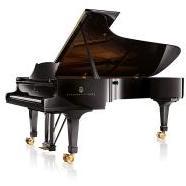Leaderboard
Popular Content
Showing content with the highest reputation on 10/14/2019 in all areas
-
Hi everyone, I've been composing music for 3,5 years, but it was not until recently I decided to start uploading my music to the internet. I've never received any musical education, I had to educate myself. The first piece I decided to upload is the "Sonata for Viola and Orchestra". Please note, that even though it says sonata in the title, I wasn't sticking to any particular composition form. I would appreciate any feedback you can give me on both my orchestration and composition and your thoughts in general. For the story behind the piece, you can check the description of the video attached here. My idea behind this composition was as follows: The motif that represents life gets introduced in the first part of the composition in a major key (0:00-0:56). Then the piece switches to a minor key and a "loss" motif start playing by a solo viola, representing the losses during the war. After the second repetition of the motif (1:00-2:24), the life motif comes back now in a minor key representing that life has changed for the worse (2:24-3:15). The loss motif is then repeated again and the piece concludes on an unstable minor add9 chord to show the uncertainty of the situation (3:15-4:30). The piece: https://www.youtube.com/watch?v=S4jGyzvWlmY&lc=z221wrhqgxznjvopt04t1aokgbir4xpajzdb5agsljhlrk0h00410 The score is attached here Edit: Uploaded the piece here as well. For the history behind it, you should still check the link Edit 2: Replaced the previous pdf file with the new one, since I found some mistakes (had incorrect crescendo markings around bars 10-11)2 points
-
Hi Everyone, I just recently finished my first "exact" composition for solo piano . Prior to this, I have been improvising and composing various themes for many years but this is the first time I went about trying to put together a coherent piece and notating it. I would love to hear what people think about it. Here's a link to my own performance ( with score) on youtube: Also, here's a link to the score (also attached as pdf) : https://musescore.com/user/25828516/scores/5759589/s/0aktCw I realize that some of the more difficult sections aren't a 100% clean in my performance. So those interested, could listen to a "100% accurate" but somewhat stiff/mechanical software (musescore) playback to evaluate those sections. ( I did my best to put hidden instructions in the software so it sounds less robotic ). I'm completely self-taught in music theory/composition and am trying to evaluate where I stand currently as far as my compositional skills are concerned. So, any kind of feedback would be highly appreciated. Also, here's a short description of the piece: The title of this piece alludes to the tendancy of this piece to drift from one style to another, from music of one period to another, from one mood to another. The music also tends to "drift" from a standard waltz form to music which has little resemblance to a waltz ( but may still maintain a slight waltz pulse) . Thank you very much !!1 point
-
As for me this fragment is too short. Because of it I think that it is still too early to say about is it a dull one or interesting. You should finish it.1 point
-
A mixture of perhaps too much rhythmic ambiguity and the fact I only heard the melodic fragment twice, and it wasn't even the full version.1 point
-
It sounds beautiful and well composed. Especially between the 2:40 and 3:10.1 point
-
Hey! I think I should point out a few things. If you decide to add a violin to the piece, it's important you note it down somewhere. If you want to have only this recording of the piece, it won't be a problem, but you expect it to ever be performed, it may be quite confusing to have a violin that play only for a few bars in the end and that wasn't "announced". Also, as you decided to add a violin, why not develop it a bit more? It would probably be very boring for the violinist to play that line, and it also sounds a little inconsistent, as it doesn't appear anywhere in the piece ever again. Also, I'd experiment more with diferent textures, so that the music doesn't have only one "feel" to it. Besides that, and what @Monarcheon said, I think this is a nice piece. Best wishes, Jean.1 point
-
It works since it gives you a nice harmonic framework to go nuts with (hopefully somewhere slightly neotonal, since it's so structured). I'm just not sure you need the theme split into two sections like that. It's a little bit confusing, formally speaking, unless one is meant to be an intro to the theme.1 point
-
I'm not sure what's with all your switching between 4/4 and 12/8 in the mid section there; it seems like the beat stays the same either way, and there aren't any major repetitions of borrowed division.1 point
-
The harmonies work, but mostly because they're pretty standard. Not a bad thing, of course. The finger-plucking section... the pattern you do it in is a tad too simple and repetitive. Disregarding chords, it feels sort of comical and a little bit more syncopation or displacement could give it some more character.1 point
-
Transitions are a little harsh. Particularly the one going back to the A section at 1:51. Ending on what's basically a subdominant chord in a harsh inversion attempting to function as a VII in your original tonic of G minor was pretty jarring, especially since there was no transitional inner voice work.1 point
-
Wow, this is amazing! Goosebumps! Your melodies make me feel a deep sense of longing, of a meaning to life I can only sometimes see.1 point
-
Hi, everyone I would like to introduce to you my new composition. It is Ballade #2 for piano. The composition was written in late romantic style. I tried to make it in classical traditions with clear music forms and simple, understandable melodies. I hope I accessed my goals at least partially.1 point
-
This is a great discussion point - and one that I think the world of composition needs. There is no secret that I am a tonal composer. It's just the music I enjoy writing and listening to. As a composer, whichever combination of tones you use will create something that is unique to you, whether is be 5, 7, 8, or 12. Provided you are not copying a piece directly, then it is original enough. The biggest problem comes from exposure. Why would a (paying) audience go to see a symphony by an unknown composer which sounded Classical, rather than their favourite Mozart one. Here lies the problem with originality - performances. Bottom line, if you want to write tonally, do it. It's still original. However atonal music is more likely to be performed, which brings me to the next point. I, as a composer, want to write music that I enjoy. If someone tells you what style of music you should write, then that will ruin the enjoyment of music for you. This is the problem with conservatoires, who tend to only accept people with an avant-garde style which they consider to be more original. Not to attack John Cage, but silence? Seriously!? Disclaimer: I mean no disrespect to atonal/avant-garde composers. You are all equally skilled and creative. I just personally don't like the style. If even one other person besides me listens to my music and enjoys it, then I feel like I have succeeded in a way. I would like to get my music performed but composition isn't my main pursuit in music so I don't mind as much. New music ensembles tend to only want to perform avant-garde pieces, and traditional orchestras generally do not accept pieces from budding composers. As a composer, I want to reach out to other musicians and show them what I have worked on. You could say I am trying to "revolutionise music" because I want to show the world that tonal composers still flourish, even though they are looked down on by competitions and festivals. I thought about this a few months ago. I love the works of the greats from the last few centuries. It appeals strongly to me, because my ear - as most ears do - perceives it as right. Tonal music is designed to be pleasant - but that doesn't mean it is limited to what most non musicians think classical music is. Take two birds sitting on a branch. One sings tonally, the other races rats over a finish line and sings the notes in the order that they place. Which one will get a mate? The ear - our ear, an ant's ear, a bird's ear - likes the harmonic relationship between the frequencies of a tonal scale. My style, as I have said before, is tonal, but I like to experiment with the changing harmonies caused by a chromatic movement. Listen to this simply beautiful piece by Grieg. I didn't play it for a while, because from looking at the score I could see it had a lot of chromaticism. But it is still tonal, and this is what I try to write. I don't count myself as a pastiche of Grieg, because I draw my style from another source. Scotland has a rich traditional music heritage, and if you listen carefully to some of my most recent music (not posted here yet) you can hear the influences from playing fiddle in a school folk band. I even write specific Scottish traditional pieces to play in the group, although that is not the main part of my output. My style? Tonal×Accidentals×Scottish Music Music is so subjective. Thanks for sticking with me, it's my longest post ever.1 point
-
This is a good topic for discussion; thanks for bringing it up! I think each of us creates "original" music in the sense that we as composers create works of music that are uniquely our own. True, they may resemble certain styles and forms of other composers—I'm not sure one can ever escape that since all of our musical ideas are built upon stuff we've heard before and internalized. As we become more experienced, we're able to remove ourselves farther away from those influences, so our music slowly takes on its own voice. As to the "style" of originality as defined by the classical music elites, I'm stumped there. The style of music heralded by the elites as "purely original" is, as you mentioned, atonal. Proponents of atonal music posit that it's a musical era just like Romantic or Impressionism, but I disagree; up until the Modern/Postmodern era of classical music, composers followed the natural "rules" of music. Debussy (an Impressionist for those following along at home) did some weird things with tonality but he obeyed the rules. The human ear is wired to interpret certain pitch relationships as consonant and others as dissonant—and these days, some as purely chaotic. Modern/postmodern classical music, with its strong atonality, is the first musical movement to actually rebel against this natural rule, or at least disregard it, in the hopes of staying original. So, all this to say that modern composers have abandoned tonality because they believe there's nothing "original" left to be had there. Again, I disagree. It takes a lot more work and creative thinking to find an original voice in the world of tonality, but it's entirely possible—and very satisfying! I've a hunch that the great composers of our generation remembered 100 years down the road will not be the progressive, 12-tone serialists churning out mind-boggling, gut-wrenching cacophonies; rather, it will be those who continued to tinker with tonality and made music that meshed with the human soul. My goals are rather simple: write music that I like. I'd much prefer to revolutionize music than reach a big audience, but (for reasons mentioned above) I don't feel like that's going in the direction of the current avant-garde styles. There's still hundreds of years' worth of exploring to do in the world of tonality! So how original do we need to be? Well, be as original as you want to be! Some people create amazing works that sound like Beethoven or Mozart could have written. Others' sound like something from an outfit from Mars. The problem I find is that composers are either cliché tonal composers (little musical training) or else they're atonal. This probably has to do with the fact that atonal music is the prima donna right now among the elites; atonal music will receive the most praise (and it's difficult to criticize since it doesn't follow a lot of rules), so "serious" composers seek originality via that route. If there are atonal composers reading this, please don't get the wrong impression! I respect your compositional styles 100%; my point is that atonal music is not the sole arbiter of originality. As you might have guessed, my music is strongly tonal. However, I use a rich combination of chords throughout so it doesn't sound too cliché. In fact, I hate having to use conventional chord progressions; I strive to avoid them when I can. My works have a strong thematic element to them but are rarely melody-driven (in other words, not like Tchaikovsky and other Romantics). I also use a lot of unconventional modulations that loosely tie to the previous key. And I love counterpoint—I always try to use it when I can. It helps ensure that all players have "interesting" parts to play! I guess I'm describing Impressionism, and maybe that category best fits my musical style. Anyone is welcome to take a listen to some of my stuff and give their own opinion. 🙂1 point
-
I don't know how much music history you've studied up to this point, but this whole notion of material-based originality came from the genesis of the Romantic era, where the advancement of middle-class music making along with the general advancement of music printing/publishing combined. Composers started using super fancy/exotic-sounding titles and used increased harmonic changes to be more expressive and have their pick at the newly free market. I'll elaborate on my own opinions/answer more of the proposed questions if this discussion gets more lively, but I'm more a fan of the way the Classical era dealt with originality, where quality was based upon how well you could use old forms and conventions in your own style/ways. It doesn't sound very modern to us because it was their styles, but Haydn's and Beethoven's music were pretty novel when they were written. The modern era has taken this Romantic ideal of expression and newness to its extreme, trying to push progress without having the patience for it. The elitism and high-artness of modern classical music generally glosses over the music most people will listen to; how subtle its changes are to formulas, but how effectively catchy the songs are. Maybe my thoughts on this will change over time.1 point







